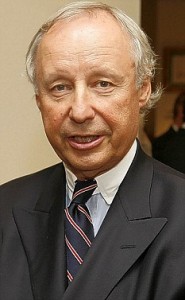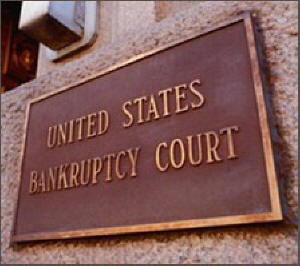Financial Failure: The Dark Before the Dawn

I spoke with a friend tonight who is in the process of filing for bankruptcy. She has lost her livlihood, her credit, her car, even her own place to live.
After two failed business ventures followed by a health challenge that left her briefly incapacitated, she finds herself now with mountains of debt and no real income. Falling on the mercy of family and friends who have fed and sheltered her the last few months, she has retreated to an earlier profession, wrangling a few hundred dollars a month from friends and aquaintances who can afford to hire her on occasion.
She has lost what most people would consider “everything.”
As I spoke to my friend, I noticed a palpable shift in her since we last spoke a number of weeks ago. Was it depression? Resignation? Anger, shame, or blame?
Not at all. While those emotions had become her loyal companions a few months ago, now, in her words, she has discovered “peace.” Even joy, gratitude, and new reasons for living!
She talked about the the importance of “living in the present,” letting go of past regrets and future fears. She spoke of her newfound certainty that she would be alright, no matter what circumstance came her way. And she decribed her confidence that she has not been forgotten by God, but is rather sustained by a God who has been faithful through this storm. She knows the road to financial recovery could be a long one, but she is discovering how to enjoy each day to the fullest, regardless of her financial situation.
 Contast this to the tales we have heard the last few months in the news, of devastated fund managers and unsuccessful or unemployed executives who have chosen to end their own lives. French fund manager Thierry de la Villehuchet, a well-respected man of significant personal wealth and honorable morals, committed suicide when he learned that several of his clients’ fortunes, as well as much of his own, had been lost in Bernie Madoff’s ponzi scheme. Facing his clients and losing his reputation and respect was, apparently, more than he could bear.
Contast this to the tales we have heard the last few months in the news, of devastated fund managers and unsuccessful or unemployed executives who have chosen to end their own lives. French fund manager Thierry de la Villehuchet, a well-respected man of significant personal wealth and honorable morals, committed suicide when he learned that several of his clients’ fortunes, as well as much of his own, had been lost in Bernie Madoff’s ponzi scheme. Facing his clients and losing his reputation and respect was, apparently, more than he could bear.
Even more tragically, some in financial distress have chosen to take the lives of family members before killing themselves. Former financial analyst Karthik Rajaram had experienced much success in his life, but had been unable to find work for a couple of years. In October of last year, Rajaram shot his mother-in-law, wife, and three children to death before killing himself in their Porter Ranch home in California.
Were they starving? About to be evicted? Did they require medical help they could not afford!? No. According to the landlord, they weren’t even behind on their rent. The kids were happy and did well in school, and Rajaram, unstable in his moods and highly frustrated by his change of fortune, had simply and tragically lost all perspective.
I believe these stories reflect a failure of perspective and fundamental confusion of our very identities. Who are we, really, and what makes us who we are? Are we our money? Our reputation? The roles we play, the job we work? Confused about the answers, living life without wealth and social standing proves too fearful a thing to face; a fate imagined worse than death.
Confronted with personal failure, public embarrassment, bankruptcy or foreclosure, some of us simply aren’t sure who we are. In extreme cases, suicide actually appears to be an option for some, perhaps because living without the things that we have allowed to define us can feel like death. And it IS a form of death – requiring the death of our previous self-concepts. Our maps fail, our compasses mislead us, and we struggle to find our bearings.
Wayne Dyer describes the myths of the ego in a recorded seminar on Inspiration: Your Ultimate Calling. I was struck by the relevance these insights have for this topic. These are the myths – the lies, if you will – that cause our identity confusion and lead us astray from our true selves. The three biggest myths are:
1. We are what we have. Our wealth and our possessions define who we are and whether or not we are “successful.”
2. We are what we do. Our careers, our hobbies, and our roles in life determine our identity.
3. We are what other people think of us – our reputation. Our ultimate reality and worth is dependent upon the respect and approval of others.
Marketing Guru and author of Wealth Attraction for Entrepreneurs Dan Kennedy surprisingly suggests that the “dirty little secret” behind many wealthy entprepreneurs’ success stories appears to be… a past bankruptcy, or similar near-bankruptcy experience of failure or “losing it all.” Of the 200 self-made millonaire and multi-millionaire entrepeneurs Kennedy has personally worked with, “nearly half of them had gone bankrupt before finally achieving lasting success and wealth.”

Indeed, the Who’s Who list of those who have gone broke at least once is impressive:
- Walt Disney (who departed Kansas City for Hollywood after the failure of his “Laugh-O-Gram” business forced him into bankruptcy)
- Henry Ford (Ford Motors was his third try after one business failure and a second near failure)
- Mark Twain (who later paid off his debts with a book tour)
- Charles Goodyear (developed the rubber technology for tires)
- P.T. Barnum (went bankupt right before getting into the Circus business at age 61)
- J.C. Penney (who ended up temporarily in a Sanitarium when the Great Depression nearly destroyed his business and his health)
- Francis Ford Coppola (acclaimed filmmaker [The Godfather, Apocalypse Now and more], winemaker and restaurateur, who was $300k in debt when the first Godfather film was completed)
- James Folger (founder of Folger’s Coffee, who encountered great success after several false starts and a bankruptcy)
- Larry King (the tv/radio personality declared bankruptcy in the late 1960’s)
- H.J. Heinz (the ketchup king went bankrupt in 1875 but re-organized into a new business with 10 billion annual revenue today)
- Conrad Hilton (Hilton lost several of his hotels in the Great Depression, but recovered to buy them back)
- Abraham Lincoln (who re-paid all of his debts over 17 years, prior to his presidency and immortalization on the penny)
- Milton Hershey (who encountered several businesses failures before making it big in chocoate)
- Cyndi Lauper (80’s pop icon, declared bankruptcy in 1980 before her hits)
- Robert G. Allen (“Nothing Down” real estate guru, “Multiple Streams of Income” author and entrepreneur, lost his dream home in an avalanche the insurance company declared an un-insurable “act of God”)
- Jack Canfield and Mark Victor Hansen (mega-selling Chicken Soup for the Soul series authors, whose first book was rejected by every major publisher)
They were all financially devastated along the path to success, and they all picked themselves up and went forward to become huge successes. (Conversely, those who come into wealth quickly with little struggle are apt to lose it all just as fast, but that’s a whole ‘nuther topic.)
Dan Kennedy (who experienced a bankruptcy himself in his early years), shares the reasons why so many entrepreneurs experience bankruptcy before achieving their greatest successes:
“Entrepreneurial success and wealth creation require a willingness to risk and experience failure and the emotional resiliency to recover from it quickly, decisively, passionately and persistently.” The past bankruptcy may reveal this trait, may have helped to develop this trait, or both.
More importantly, bankruptcy can be a profound experience that leads entrepreneurs to a new understanding of and relationship with money:
When you experience bankruptcy, you feel as if life is over, that you’ll never recover, that you’ll forever have a big red ‘B’ on your forehead, that you’ll never get credit. Then, when you discover none of that is true and that money is readily available, wealth replaceable more quickly and easily than the first time around, the light bulb comes on. It’s a huge ‘Ah-ha!’ and a giant ‘Well, I’ll be damned.’ From the moment of that realization forward, your fears about money are permanently banished and erased. What you feared was fatal turned out to be less than a flesh wound. Now you can’t be scared again.
Probably nothing slows down and stops success as much as fear. Fear of success, fear of failure, conscious or unconscious debillitating fear. As Kennedy observes,
more people are controlled and inhibited by their fears about money than by any other kind of fear…. When you jettison all money fears, you instantaneously become magnetic to money. I now believe your bank balance reflects the ratio of fear vs. confidence you have about money.
Sometimes the best antidote to your biggest fear is to face it, live through it, and rise victorious over it.
Am I saying that bankruptcy is “no big deal” or that it is a stepping stone to success? Not at all! The implications of having your credit ruined can be painful, expensive, and not quickly solved. If anything, I am suggesting that the sooner we can learn the lessons that bankruptcy appears to have taught the many who rose above it, the sooner we can find our own paths to lasting success and holistic wealth.

If you are going through a bankruptcy or foreclosure, do not despair. It is not the end, only a beginning in disquise.
Look to nature; the natural cycles of death and rebirth are proclaimed by the trees, fish, flowers, butterflies, and all of creation. Look to history and see new ideas, movements, even civilizations rising from the ashes of the old. Look to the great religions of the world and the ancient traditions; you’ll find themes of resurrection and rebirth in all of them. As Evangelist Tony Campolo proclaims again and again in his signature sermon, “It’s Friday… but Sunday’s Comin’!”
Things may look dark, they may look hopeless, it may look like the game is over and you’ve already lost. But nothing could be further from the truth. If you look toward the horizon, you’ll see a glow. The beautiful glow of the sun preparing to rise.
For many of us, this has been a difficult financial year. It has been difficult for me, too, and yet, I would not trade all that I have learned for an easier year.
I have learned valuable lessons about business, investing, liquidity, diversification, and economic market cycles. (Much of this I had “learned” previously in books, but experience is a more lasting teacher.) I can see on a deeper, more profound level that I am truly not my money, what I do, nor my reputation. I have discovered new levels of wealth, worth and wisdom on the inside that do not revolve around my temporary external circumstances. While I have watched my net worth plummet, I have built my inner strength and determination, knowing that I will rise stronger than ever.
I wish you Financial Resurrection, Peace and Joy beyond all circumstance, and a Happy Easter.
Kate Phillips
Really great article, thank you for sending it. All the best, Cori
Excellent article. Much to reflect on. Looking forward to reading more.
Thanks Cori and Peter, for reading and commenting.
Kate
A powerful article, Kate. Really thought provoking. I appreciate that you suggested I read it. I do feel more inspired to see the glow in the future.
Nancy
Thanks Nancy! It inspires me, too, the whole idea that there is something valuable and even freeing about our hard times. I put one of the sunset pictures on my computer desktop to remind me!
What an amazing and inspiring article! I have been tossed and turned by the financial chaos and pressures that abound right now. In the process I am also getting in touch with the things that make me truly happy…and they aren’t about money! They’re about creativity, being connected to others, being surrounded by nature, music. I make time to enjoy them every day. I’ve discovered that I am better able to make decisions when I am not drowning in worry and fear and i think I am making better decisions, too.
Oops, I meant sunRISE pictures (Nancy).
Thank-you Susan! Yes, happiness and financial wealth are only indirectly connected, and money can’t buy love, just like John and Paul sang. However, we do need money to live in modern society, and we need to be self-aware of what makes us happy so that money can “serve” our ultimate mission, purpose and happiness in the best way. (And I agree with Chellie Campbell, who says that since we are spiriual beings having a physical experience, she would like to succeed and progress on both planes!)
Funny, I usually crave being with people and going to services on Easter, but writing this was my Easter activity, one I carried out with joy as it unfolded.
Kate
Great blog Kate, all of your posting’s are a wealth of information, very informative.
This article is very timely for my husband and I. We’re thinking about filing for bankruptcy. My husband is ashamed about it. We’ve never been so worried about finances before–and it feels bad to be so concerned about it. I definitely have hope, and am looking forward to moving on from our debt.
We also get pretty down about not know what we want to do next for jobs and careers. I keep reminding myself but I have a hard time getting the concept into my brain that I am not what I do as a career.
Thank you for this encouraging article. I will pass it on to my husband.
Thanks Lydia. This article seems to have “struck a chord” with many. A lot of people are in financial pain right now, and situations they never thought they’d be in.
(I can relate! Right now I’m trying to short-sale a rental house which lost so much value it is now a complete liability and no longer an asset.)
Fortunately, these situations are only temporary, unless we “identify” with them and let them define us.
Regarding career, we aren’t what we do, and yet, we are most empowered when we can find a way to DO the thing that we ARE – i.e., to express our mission, our talents, and our desires through a career that aligns with our “calling.” A true vocation, not just a “job.”
When we have a job or a business that does not express who we are and our mission, it is especially important to not let that become our identity. And even when our work does align with who we are, we get to remember that “who we are” can grow, change, and expand, and is not limited or defined by our work.
Thanks for the extra wisdom.
Your perspective on financial failure means more because you are going through it too!
True, true about careers. Finding the right career is really important to me. I know what I want to do but I’m not skilled enough to do it yet. I answered all of your questions this morning from the law of attraction post. It gave me something to think about.
Glad the questions were helpful, Lydia, and good for you for “doing the work.” It’s worthwhile.
Funny, even though I’m accepting short-sale offers on a rental property, it doesn’t occur to me as “financial failure.” I guess it did occur to me as an “investment failure.” I thought I would sell this year and walk away with $30k or $40k in my pocket, but instead, the home is worth $40k less than I owe on it now. After a lot of successes, it was a bit of a shock to be in this situation and definitely uncomfortable.
But “failure” is essentially the interpretation or label we give to something, it’s our “story” about it. We can just as easily view something as a “learning experience.” Yes, the numbers on the paper missed their mark in a huge, huge way. As an investment, it is a “failure,” and a lot of homeowners are going through this same “learning experience” right now, as well as a lot of lenders.
The experience has taught me to look at what the “learning” might be for me. The lessons are many, some of which were in this post. But a key one for me (who has had “the Midas touch” for years), was compassion for people going through hard times. I truly realize now that it can happen to anyone, and have noticed that financial failure of some form another is something many of my mentors have in common. (Hmmm… maybe that’s how they got to be “mentors.”)
Hi, good post. I have been woondering about this issue,so thanks for posting. I’ll definitely be coming back to your site.
Excellent! I personally own and run a site and I understand the high priority of quality content and its vast impact on the quality of a website. I just wanted to give some props to you.